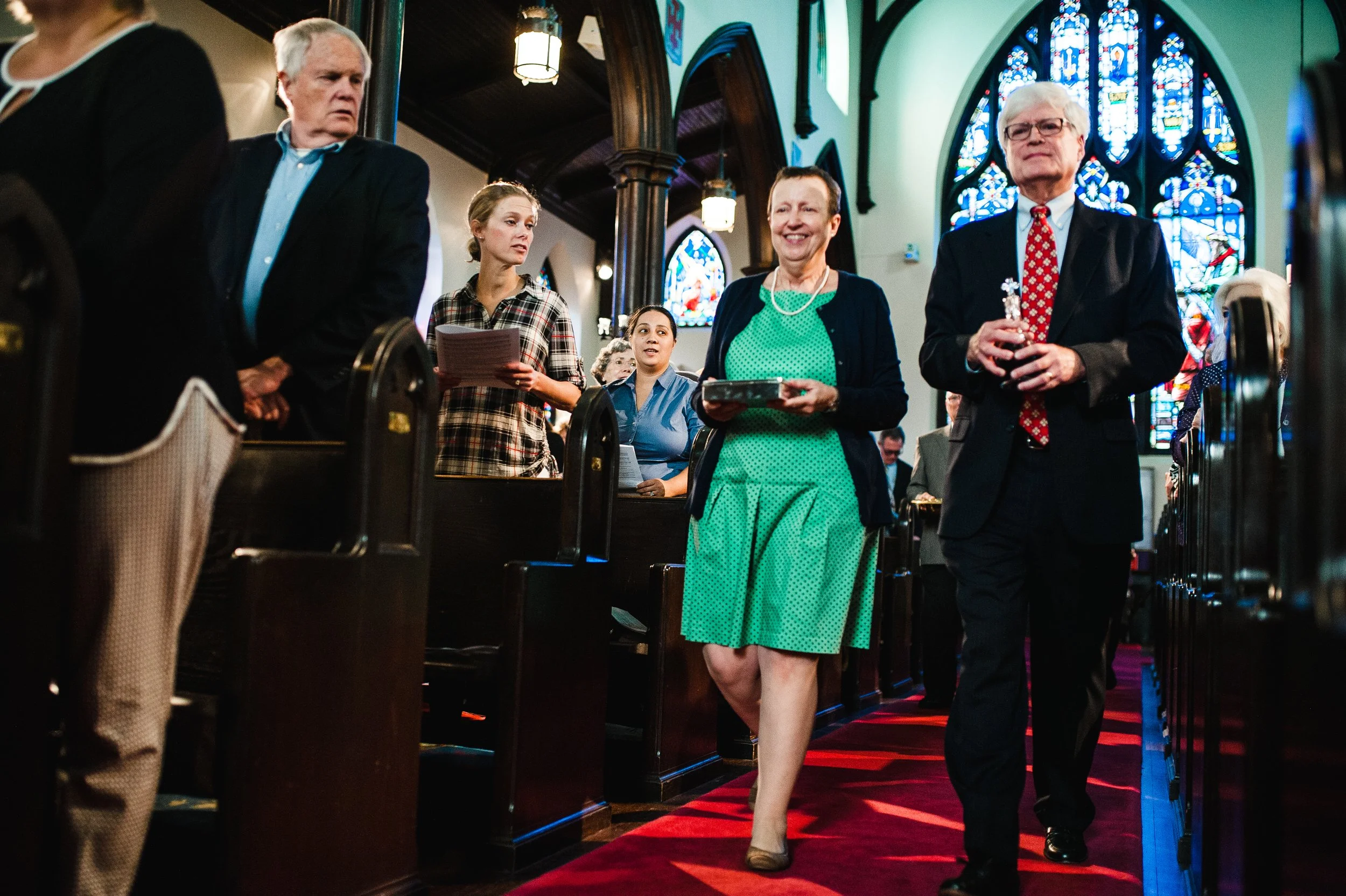
How we worship at Saint James’ Warrenton
Worship at Saint James’ is …
-

Eucharistic
Eucharist is an ancient Greek word for “thanksgiving”. We gather each week and share a meal of bread and wine in thanksgiving for Christ’s loving sacrifice of his body and blood upon the cross. Our form of worship has changed little over the centuries, and we continue this practice because Jesus invites us to share his body (bread) and blood (wine) in remembrance of him. When we gather, we prepare ourselves to receive God’s grace, we come to the table shoulder to shoulder in communion (as a community) with one another and with Christ, and are immediately sent to share that grace with the world. Sometimes this is also called the Lord’s Supper, Holy Communion or the Mass.
-

Corporate
We worship God together. That means we are not passive participants in the worship of God. Of course, you could stay seated and quiet throughout our service, but you would miss out on a great opportunity to participate. Our worship is taken directly from the Book of Common Prayer found in the rack in front of each pew. In 1549, the first Book of Common Prayer was groundbreaking in that it was in the language of the people and encouraged people to be active participants in worship. We unite our voices to the glory of God through Jesus Christ by the power of the Holy Spirit.
-

Everyone
Why? Because everyone has a role to play! The clergy act as masters of ceremonies, or prompts, if you prefer, guiding everyone through prayers and singing. They teach, preach, and lead everyone in the celebration of the Holy Eucharist, which is why they are called “celebrants”. The choir supports us all as we sing together. Members of the congregation, called the laity (or laypersons or laypeople) lead readings from the Bible, and help the clergy by serving as acolytes, crucifers (cross bearers), and chalice bearers and servers in Holy Communion. At all times, worship is a corporate and cooperative experience; it is never a “one-person show.”
-

Sacramental
We find our identity rooted in the sacrament of Baptism, which is full initiation by water and the Holy Spirit into Christ’s body, the church (BCP 298). Sacraments are outward and visible signs of inward and spiritual grace, given by Christ as sure and certain means by which we receive that grace (BCP 857).
Through sacraments we experience the presence and grace of God. Thus to be sacramental is to believe the grace of God is made present in the world, particularly in worship and the sacraments of Baptism and Eucharist. Our experience of these sacraments governs our worship and our worldview, since through them we know God is not distant but present with us in these acts and in the world.
Weekly services
Sunday at 8 a.m. and 10:15 a.m.
Sunday is the pinnacle of the week at Saint James’. We offer two Sunday-morning Eucharistic services, each following Rite II from the Book of Common Prayer.
The 8 a.m. service is the shorter of our two Sunday-morning services, since there is no music, but it otherwise follows the same liturgy as the later service. This service provides the opportunity to receive Communion and reflect quietly on God’s word.
The 10:15 a.m. service is our principal weekly worship service. It features the choir and includes an opportunity for children to participate in Children’s Church before re-joining their families midway through the service to receive Communion. Nursery is also available during this service for children under 4.
Wednesday at 12 p.m.
This intimate Eucharistic service follows Rite II from the Book of Common Prayer.
Thursday at 7:30 a.m.
Bishop Ted Gulick presides during this intimate Eucharistic service, which is followed by a discussion and a light breakfast in the Parish Hall.


